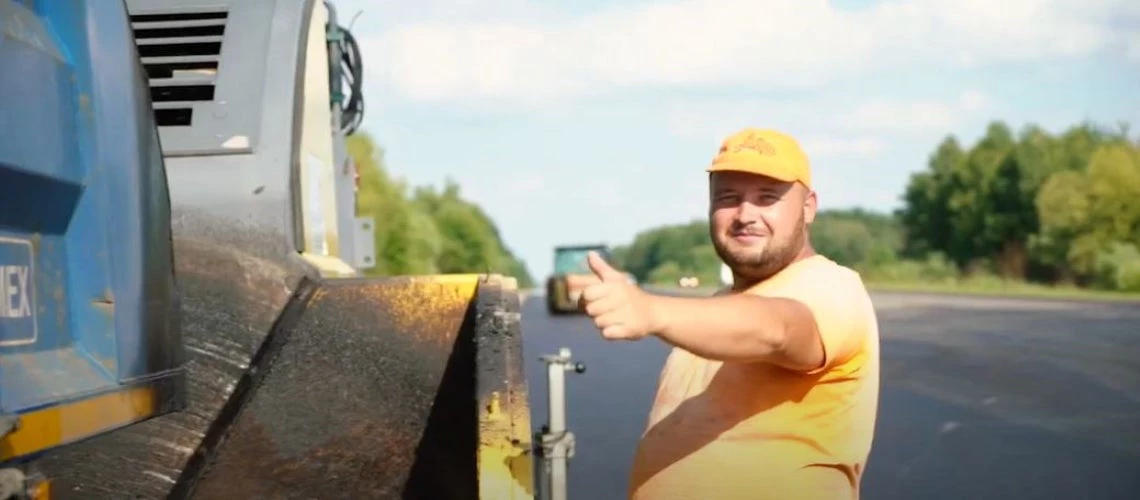 Ukrainian construction working improving existing road | © International Finance Corporation
Ukrainian construction working improving existing road | © International Finance Corporation
Geographically, Ukraine is in an enviable position: it lies on several major transportation routes that connect Europe to Asia, it’s mostly flat, and its many rivers and waterways connect it to the Black Sea, and from there, the world’s oceans. These features position the country well as an important international trade hub.
However, it faces an important challenge as the country’s transportation infrastructure is in need of serious rehabilitation and modernization, especially its roads—170,000 kilometers of them—including the 47,000 kilometers of international, national and regional roads maintained by the state/state automobile agency. Regular users of Ukraine’s roads find them unreliable in terms of road quality, safety, and comfort. Roadside infrastructure is also poor.
Ukraine’s government is well aware of the situation. In 2019, it launched the “Great Construction” project, which includes 150 billion Ukrainian hryvnias (about $5.3 billion) for road and highway construction. But that’s not enough. According to the State Road Agency, Ukravtodor, the country’s road system needs at least $6 billion annually in rehabilitation and upgrades over the next five years. Although this represents a considerable sum, much more funding will also be required for ongoing road maintenance. Like in many countries, public resources are scarce, and Ukraine would like to spend its public money where it is needed most.
This is where the private sector comes in. A study presented by IFC and the World Bank, in partnership with the Global Infrastructure Facility (GIF), found that public-private partnership (PPP) projects could attract about $2 billion in road investments from the private sector through 2023. That doesn’t fully cover the financing gap identified by Ukravtodor, but it could make a big difference. And successful investments in the sector through PPPs would demonstrate the feasibility of that business model and open the door for future financing.
Kicking off Ukraine’s new road PPP program
The study laid the foundation for the Road PPP Program in Ukraine, launched on October 29, 2020. The initiative aims to engage the private sector through PPPs to improve and maintain Ukraine’s road network using a phased approach.
A pre-assessment study funded by the Public-Private Infrastructure Advisory Facility (PPIAF) and the GIF concluded that up to 20 road projects can be funded through PPPs. In the first phase of the program, IFC will serve as transaction advisor for the first six pilot PPP projects to rehabilitate and maintain 1,400 kilometers of roads in 10 regions that will benefit 12 million people. Under this phase, concessions will be awarded to private sector partners through a transparent bidding process supported by IFC. The projects are expected to range from $200 million to $350 million in size and will be implemented by the end of 2023. The private partner will be compensated through annual or semi-annual payments from the government under performance-based contracts. Pre-feasibility studies for the six pilots have already been conducted.
If successful, two more phases (beginning in 2023 and 2025) will be implemented, drawing from the lessons learned during the pilot phase. In the long run, the program aims to attract up to $10 billion in investments for more than 20 projects that will cover a total of 4,500 kilometers of roads. The phased approach will allow all stakeholders—including government, investors, lenders, insurance providers, subcontractors, and suppliers—to learn and adapt from their experiences. As the projects proceed, they will gain a much better understanding of the market and the challenges.
Experienced private sector partners can bring a lot more than money to the table. A well-structured PPP framework will attract firms with a solid track record in the road sector, which reduces overall project risks. This experience is important for Ukraine, which has relatively underdeveloped road construction and maintenance capacity.
IFC will build on its previous work on PPPs in Ukraine. IFC was also the key transaction advisor for two port concessions, Olvia and Kherson—the country’s first PPPs in the port sector— in cooperation with the European Bank for Reconstruction and Development (EBRD) and GIF. IFC helped develop critical legislation—including the preparation of the concession law and amendments to the Law on PPPs in 2019. IFC also helped establish the State PPP Agency, SPILNO, with support from PPIAF.
Underpinned by support from international organizations, the transactions attracted the largest external investment in Ukraine’s ports since its independence.
Based on this experience, roads come as a logical next step. However, a lot of work will need to go into the process, as PPPs have never been successfully used to build or maintain roads in Ukraine, despite several attempts. Transparency in the process is paramount to build trust among stakeholders and to ensure the projects are viable for the duration of the concession. A modern, efficient road system is an essential part of a strong, vibrant economy. The pilot PPP program is a giant step towards this objective.
Related posts:
Ukraine: How international partnerships are contributing to the development of transportation infrastructure
Using guarantees to drive efficiency gains in road PPPs by reducing costs
Mythbusters: Overcoming macho tendencies in funding toll roads
This blog is managed by the Infrastructure Finance, PPPs & Guarantees Group of the World Bank. Learn more about our work here.



Join the Conversation